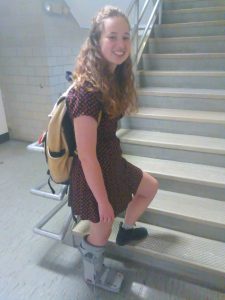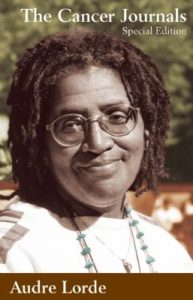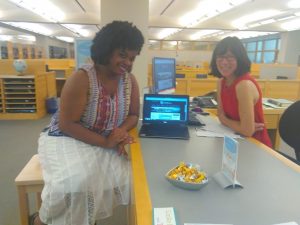October is Disability Employment Awareness Month. Come to the Davis Family Library atrium October 2nd- 15th to see our display that includes books and DVDs that touch on a variety of themes related to disability. Also read below about the various efforts made to make our campus more accessible and inclusive. Many sincere thanks to Marlena Evans for her work in designing this month’s banner and to the Advisory Group on Disability, Access, and Inclusion for its generous guidance.
Name; Hometown; Role On Campus; Time at Midd:
BK: Bill Koulopoulos; Athens, Greece; Director of Academic Technology, 3 years
CC: Courtney Cioffredi, Lebanon, New Hampshire; Americans with Disabilities Act (ADA) Coordinator; 7 Months
ZS: Zach Schuetz; Bedford, New Hampshire; Senior Technology Specialist; 4 years (student) + 5 years (staff)

Junior Feb Ruby Edlin, from Hoboken, New Jersey, poses on the stairs wearing a medical boot meant to heal a former injury. At least one of her classes requires her to use the stairs.
KS: Katrina Spencer; Los Angeles, California; Literatures & Cultures Librarian; 8 months
We’re interested in disability access, inclusion, and full-participation. Why does disability awareness and inclusion matter?
BK: Because good design should accommodate everyone; one size does not fit all and variety is the spice of life.
CC: We (society) were supposed to have understood that separate is not equal a number of years ago, we are still fighting to see that concept realized; awareness helps to move toward inclusion. Inclusion matters because every body and difference adds value to our society. We will all likely be disabled someday: it’s only a matter of time for some of us; others live it every day.
ZS: Because designing systems to accommodate people with disabilities is often easy, but only if it’s planned from the start of the project. Changing things afterwards is often a lot harder; hence, it’s important to be aware of potential issues all the time and not wait for someone to make a complaint.
KS: As we continue to make our societies better for everyone, including those belonging to historically marginalized populations (racial, religious, sexual, etc.), disability must be treated with thoughtful attention, too. Disability is certainly intersectional and affects every color and creed. When we improve access, it helps broad swaths of the population and hurts no one.
Give us an example of improved access here at Middlebury that you want others to know about and why it matters.

Featured here is the book cover image used for Cece Bell’s 2014 graphic novel El Deafo, a memoir that traces the author’s childhood experiences with deafness. This is one of the works to be featured in the October display.
BK: The College has subscribed to Sensus Access (go.middlebury.edu/sensusaccess/), which is a web-based, self-service application that allows users to automatically convert documents into a range of alternate and accessible formats. The service has been used hundreds of times the last couple of years, which suggests there is need for such a service and prompts us to reflect on additional ways to improve access.
CC: The College has added a second ADA Coordinator to Student Accessibility Services. Prior to that move, this was an office of one. The addition of this position allows two people to assist with access while the College continues to grow towards inclusive programs. This has allowed Student Accessibility Services to grow and provide additional programs, trainings and resources for students and faculty.
KS: When I started working here, I noticed that questions asked at the Research Desk could develop into conversations that lasted 15, 20 or even 30 minutes. I recalled that when I was a graduate student, I found it very uncomfortable to participate in research consultations having nowhere to sit, so I requested a stool be made available for lengthier conversations. It was a subtle change, but one for the better.
What are some resources to learn more about disability access and inclusion?
BK: Understanding the principles and concepts behind Universal Design for Learning (UDL) will benefit anyone promoting disability access and inclusion at Middlebury College. UDL on Campus is a great resource on course design, materials and policy.
CC: Project Shift is a great resource and includes a number of readings regarding disability access and inclusion in Higher Education. I was also introduced to Mia Mingus recently and found her blog Leaving Evidence to be an excellent resource. Lastly, Student Accessibility Services is always willing to talk disability, access, and inclusion

Pictured is the cover art used for Audre Lorde’s 1980 autobiographical experience of breast cancer, The Cancer Journals, a work now on order for the Davis Family Library, also to be featured in the October display.
here on Middlebury’s campus.
ZS: I find that listening directly to people with disabilities has been really enlightening. There are a number of online communities where people are willing to share their experiences, and I’ve also learned extremely useful terminology like the curb-cut effect and the social model of disability.
KS: I recently learned that Middlebury has a Disabilities Studies Reading Group that has been meeting since 2009. Its first meeting this fall will be Thursday, October 12th, 7:00 p.m.- 8:30 p.m. in the American Studies Lounge, Axinn 242. For more on this, contact Susan Burch at sburch@middlebury.edu.
In what other ways might we forward disability access, inclusion and full participation?
BK: Seeing accessibility and inclusion from a social model rather than a medical model lens requires a mindset shift. Education is key in facilitating this shift. In the era of information technology, there is a wealth of resources available to individuals who want to learn more and people on campus ready to assist in the exploration.
CC: Shifting our Middlebury culture to a place where disability is celebrated as an identity, rather than something that needs accommodation would be a large step toward thinking about disability as part of diversity and inclusion. Each department, academic and operational, could own access in that department by seeking information and suggestions for ways in which events, classes, courses, and programs could be more inclusive to all. I would love to see student groups celebrating disability, access and inclusion and current student groups asking about how to ensure their events are accessible to all, including students with disabilities.
ZS: Classroom policies could be more focused on core pedagogical goals. Will students really not be able to learn the material if tests are untimed? If they can take notes on a laptop or record the lecture? If instructors make a note of sensitive material so people can mentally prepare themselves for it? Inclusion can be built in from the start. The ADA office is great, but for every student who’s already gotten a formal diagnosis, worked with them, realized what situations will come up in a course, and asked for specific accommodations, there’s one who hasn’t (yet) but could benefit from a little proactive thinking so everyone can fully participate in the course.

Literatures and Cultures Librarian Katrina Spencer and Director of Reference & Instruction Librarian Carrie Macfarlane pose at the Research Desk where a stool has been installed to improve access.
KS: Last semester I went to visit a foreign language class in Munroe Hall that was held on the third floor. I was carrying graphic novels with me at the time to share with students and had to haul them up three flights of stairs. I asked for an elevator and didn’t find one. This is when I realized that stairs can actually be a barrier to access for learning, working and creating community. How do we determine which buildings are accessible and which are not? How do we make our campus accessible to all?
If you have more ideas for how to improve access on and around our campus, or want to know more about disability access and inclusion at Middlebury, write to the Advisory Group on Disability, Access, and Inclusion at agdai@middlebury.edu. Also see the libraries’ lib guide dedicated to disability studies, developed with and maintained by Librarian Amy Frazier.